The government shutdown of 2018/2019 created a bit of a setback for HUD 232 borrowers, but there’s no need to worry this year, at least, not yet. Cambridge Realty Capital President Jeffrey Davis is pleased that a continuing resolution was signed in late November, extending funding legislation until late December, meaning that HUD 232 applications already being processed won’t be delayed even longer. However, the prospect of an upcoming shutdown isn’t entirely moot, and Davis’ advice to senior housing operators who are thinking of obtaining a HUD loan or are in the very early stages of the process to “act quickly in order to ensure a timely closing.”
Last year’s shutdown was the longest in US history, lasting 34 days from late December 2018 to late January 2019. Applications were not processed during that time, adding a month or more to average closing times for borrowers.
In spite of this, Cambridge continued to accept and underwrite HUD 232 applications during the shutdown. “Our part of the process is significant, particularly the underwriting aspect, and is independent of HUD’s review and approval process. We are still able to perform our part of the process up to submitting the paperwork to HUD. We will do the same this year, should a shutdown still occur,” Davis assured.
Still, he says, a delay is inevitable in the event that a new agreement cannot be reached in December. “Everyone is hoping to avoid this,” Davis said. He is urging potential HUD applicants to move quickly in order to minimize any possible delays. “Gathering proper documentation and preparing necessary paperwork is meticulous and time-consuming at the best of times, but the more you can have in order before a shutdown, the better your chances of minimizing delays in closing.”
Cambridge Realty Capital has been a HUD 232 loan provider since the 1990s. Since that time, Cambridge has closed more than 550 HUD loans worth more than $6.5 billion. “Our extensive history and experience in underwriting HUD 232 loans gives us exceptional expertise in what will and won’t meet with HUD’s approval. Often, we are able to get to the closing stage quicker than average because of this. Our average processing time here at Cambridge is six to nine months, and sometimes even less.” Davis also added that HUD has taken steps in recent times to improve processing times on its end, the most notable change being the introduction of Lean. “The queue times for loan processing have dropped considerably,” he noted.
Cambridge has prepared a document entitled HUD LEAN 223(f) & 232/223(f) Refinancing Flow Chart of Estimated Timing for Processing, outlining approximate timelines for the various stages of HUD 232 loan processing. This document is available for downloading at https://www.cambridgecap.com/wp-content/uploads/2018/03/flowhudlean223refi.pdf.




